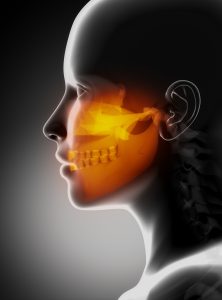Temporomandibular Joint (TMJ)
What is temporomandibular joint pain?
Temporomandibular joint (TMJ) disorder is a problem related to your facial jaw joint. Symptoms occur when the joints of the jaw and the chewing muscles (muscles of mastication) do not work together correctly. If a TMJ problem or disorder occurs, it can make eating, talking and even yawning quite painful. Reasons that could be the cause of a TMJ disorder include clenching or grinding of the teeth, tightening jaw muscles, disease or in

jury. The cause of TMJ dysfunction may involve the muscles of the joint, the bite or the joint itself.
What are the symptoms of a TMJ disorder?
- Clicking or popping of the joints
- Tender or painful jaw muscles
- Difficulty or pain upon open or closing the mouth
- Frequent headaches or neck aches
- Pain in the temporo-mandibular joint
- Ringing or buzzing sound in the ears
- Sensation of stuffiness, pressure blockage or pain in the ears
- Dizziness or light-headedness
- Decreased jaw opening
If you recognize one or more of these symptoms as being yours, you probably have a TMJ problem. Clinical and radiographic examination of the jaw allows the surgeon to establish a proper diagnosis and recommend appropriate treatment.
Sequence for treatment varies with the diagnosis and the individual. It is important to note that the treatment usually works best with a team approach of self-care joined with professional care. The initial goals are to relieve the muscle spasm and joint pain. This is usually accomplished with the help of anti-inflammatory medication, muscle relaxants or a pain relievers. Steroids can be injected directly into the joint to reduce pain and inflammation. Home care is important at this stage and includes:
- Resting your jaw
- Keeping your teeth apart when not swallowing or eating
- Eating soft foods
- Applying ice and heat
- Avoiding nail biting and gum chewing
- Decreasing cafeine intake
- Practicing good posture
- Stress management techniques, acupuncture, physiotherapy or osteopathy may also be indicated.
In certain cases, the making of an occlusal plate (mouth guard) which is worn at night, helps relax the jaw muscles and reduce pain. As a last resort, correction of your bite can be obtained by equilibration, orthodontic treatment or surgery in cases of severe malocclusion or when the conservative treatment has not given the desired results.